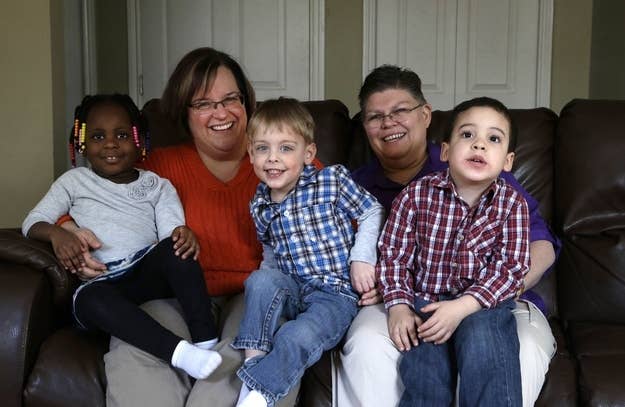
April DeBoer and Jayne Rowse had hoped to leave court Thursday with a ruling that the Michigan constitutional amendment banning them from marrying is unconstitutional. The lesbian couple, who are raising three children together, are seeking to adopt each other's kids — two initially were adopted by Rowse, one was initially adopted by DeBoer — but Michigan law only includes second-parent adoption for married couples.
Following a hearing Thursday, the question will hang in judicial limbo for a few more months — which is exactly what many marriage equality proponents wanted.
Hoping to avoid a marriage case being heard by the more conservative Sixth Circuit Court of Appeals, several organizations fighting for marriage equality — including the American Civil Liberties Union, Human Rights Campaign, Lambda Legal, and National Center for Lesbian Rights — suggested in a December 2012 filing that the court hold off.
The groups wrote that before resolving the Michigan couple's case, "this Court may determine that it is prudent to await decision" in the California Proposition 8 case at the Supreme Court.
Federal Judge Bernard Friedman took the national groups' recommendation Thursday and is holding the couple's case to await word from the Supreme Court before issuing a decision in DeBoer and Rowse's case.
Although the LGBT groups' moves have been out of the spotlight as the DOMA and Proposition 8 cases took center stage, they shed light on the careful approach LGBT legal advocacy organizations have taken in the past couple of years. Although courtroom successes have been plenty in challenges to the Defense of Marriage Act, more direct marriage-rights cases have met with mixed results. Courts in the Proposition 8 challenge have found the California amendment to be unconstitutional, but federal marriage equality lawsuits in Hawaii and Nevada were rejected by trial courts.
The Michigan case initially wasn't even about marriage, as the couple only sought to be allowed second-parent adoptions. At the judge's suggestion, however, the couple amended their complaint to directly take on the constitutionality of the state's restrictive marriage amendment, which says "the union of one man and one woman in marriage shall be the only agreement recognized as a marriage or similar union for any purpose."
The case, initially filed in January 2012, came only after several LGBT organizations declined to participate, Dana Nessel, one of the couple's attorneys, told BuzzFeed Thursday. "What they told us is that they refuse to touch anything in the Sixth Circuit [Court of Appeals]."
The fear: they would lose.
Jay Kaplan of the ACLU of Michigan told BuzzFeed Friday that Nessel's assessment was accurate, saying, "If you're going to bring a marriage equality claim, you want to be sure that you're going to be successful at all stages of the process." Of the Sixth Circuit, he said, "There is not a progressive majority on the court."
Still, Nessel said she and a couple other lawyers took on the case pro bono because of "our belief that this is totally unjust."
On Thursday, however, Friedman put the case on hold. The main reason for the delay is because many observers are expecting the Supreme Court to give some guidance to lower courts on whether laws that classify people based on sexual orientation — like the marriage bans — should be subjected to a closer scrutiny when examined by courts. If so, a type of heightened scrutiny will apply and governments will need to show an important reason for the laws. If not, rational basis applies and governments need only show a legitimate reason for the laws.
Although Nessel said she understood the judge's reasoning, she added, "I think we have such good arguments under rational basis, that we could have won under that."
"I have every confidence in the world that we're going prevail and that Michigan's marriage amendment is going to be struck down as unconstitutional [and] gays and lesbians won't be second-class citizens," she said, acknowledging, "We were really hoping that today would be the day."
Although LGBT organizations — led by the ACLU and supported by Michigan LGBT groups, the Human Rights Campaign and others — are supporting the couple's claim, a brief filed with the court in the case urges the initial, far more limited solution to the case. Although the couple is now seeking equal marriage rights, as well as second-parent adoption rights, the LGBT groups' brief focuses only on the latter solution.
Explaining, Kaplan, the ACLU attorney, said, "There might be other ways to reach this conclusion. You don't need to necessarily decide the marriage issue." He added, though, "If you choose to do so, we support marriage equality."
Looking forward at the Supreme Court's consideration of DOMA and Proposition 8, however, Kaplan said that regardless of the specific strategy in the Michigan couple's case, it shows the national movement on marriage equality.
"It's demonstrating the incredible momentum and progress," he said. "The fact that a state like Michigan, which has one of the most restrictive amendments in the country — the fact that a court would be looking at the constitutionality of that shows how much this issue is moving along."
